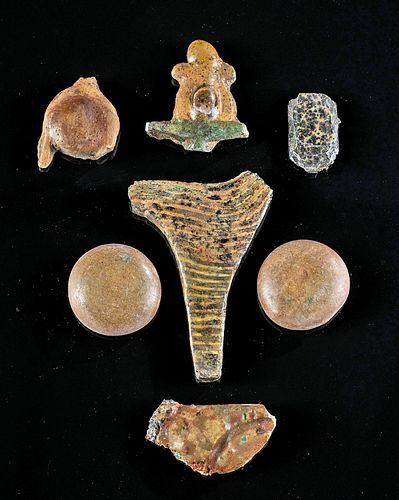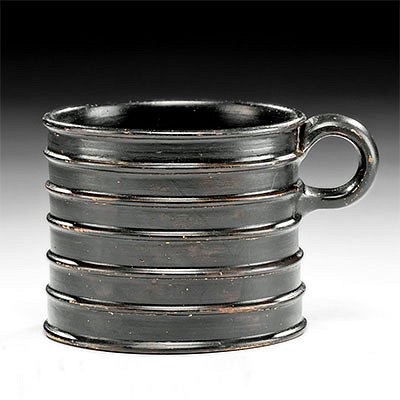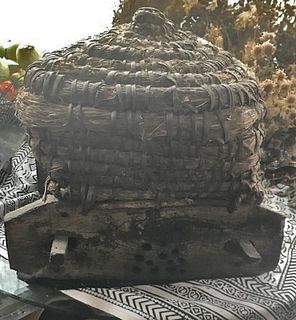Lot of 7 Egyptian Glass Inlay Fragments
Lot 14
About Seller
Artemis Gallery
686 S Taylor Ave, Ste 106
Louisville, CO 80027
United States
Selling antiquities, ancient and ethnographic art online since 1993, Artemis Gallery specializes in Classical Antiquities (Egyptian, Greek, Roman, Near Eastern), Asian, Pre-Columbian, African / Tribal / Oceanographic art. Our extensive inventory includes pottery, stone, metal, wood, glass and textil...Read more
Categories
Estimate:
$2,500 - $3,500
Absentee vs Live bid
Two ways to bid:
- Leave a max absentee bid and the platform will bid on your behalf up to your maximum bid during the live auction.
- Bid live during the auction and your bids will be submitted real-time to the auctioneer.
Bid Increments
| Price | Bid Increment |
|---|---|
| $0 | $25 |
| $300 | $50 |
| $1,000 | $100 |
| $2,000 | $250 |
| $5,000 | $500 |
| $10,000 | $1,000 |
| $20,000 | $2,500 |
| $50,000 | $5,000 |
| $100,000 | $10,000 |
| $200,000 | $20,000 |
About Auction
By Artemis Gallery
Mar 12, 2020
Set Reminder
2020-03-12 10:00:00
2020-03-12 10:00:00
America/New_York
Bidsquare
Bidsquare : Ancient / Ethnographic Around The World
https://www.bidsquare.com/auctions/artemis-gallery/ancient-ethnographic-around-the-world-4957
Ancient art from Egypt, Greece, Italy and the Near East, as well as Asian, Fossils, Pre-Columbian, Native American, African / Tribal / Oceanic, Spanish Colonial, Russian Icons, Fine art, much more! Artemis Gallery info@artemisgallery.com
Ancient art from Egypt, Greece, Italy and the Near East, as well as Asian, Fossils, Pre-Columbian, Native American, African / Tribal / Oceanic, Spanish Colonial, Russian Icons, Fine art, much more! Artemis Gallery info@artemisgallery.com
- Lot Description
Egypt, Ptolemaic to early Romano-Egyptian period, ca. 332 BCE to first half of 1st century CE. A wonderful gathering of seven fragmentary glass inlays meant to adorn recessed areas on wooden coffins or limestone reliefs. One millefiori fragment features beige-and-brown checkered patterns above a crescent-shaped groove, and a rectangular pulled-glass fragment exhibits a stunning amethyst color. Two mold-cast hemispherical roundels are shaped from beige-hued glass and were perhaps meant to adorn a crown or vestment. A depiction of an Atef crown features ostrich feathers, ram horns, and a frontal sun disc, and the headdress of Hathor bears a maroon-hued sun disc flanked by a pair of cow horns. The largest fragment is a black-and-white striped composition formed via the mosaic technique that perhaps depicts a false beard. Size of largest (false beard): 2.2" L x 1.5" W (5.6 cm x 3.8 cm)
For a wonderful example of glass inlays inserted into a wooden coffin, please see: Stern, E. Marianne and Birgit Schlick-Nolte. "Early Glass of the Ancient World: 1600 B.C. - A.D. 50 | Ernesto Wolf Collection." Verlag Gerd Hatje, Germany, 1994, p. 60, fig. 90.
Provenance: ex-Dr. Sid Port collection, California, USA, acquired in the 1970s; ex-Norman Blankman collection, New York, USA, acquired in the 1950s in Cairo, Egypt
All items legal to buy/sell under U.S. Statute covering cultural patrimony Code 2600, CHAPTER 14, and are guaranteed to be as described or your money back.
A Certificate of Authenticity will accompany all winning bids.
We ship worldwide and handle all shipping in-house for your convenience.
#153325Five of seven items are fragments of larger glass compositions, and two round-topped discs are intact; all items have been professionally cleaned and conserved. Largest fragment repaired from a few large pieces, with restoration to midsection, and resurfacing with light overpainting along new material and break lines. All items have minor abrasions and nicks to faces and peripheries, with softening to some finer details, and light encrustations. Great remains of original color and nice iridescence throughout.Condition
- Shipping Info
-
All shipping is handled in-house for your convenience. Your invoice from Artemis Gallery will include shipping calculation instructions. If in doubt, please inquire BEFORE bidding for estimated shipping costs for individual items.
-
- Buyer's Premium



 EUR
EUR CAD
CAD AUD
AUD GBP
GBP MXN
MXN HKD
HKD CNY
CNY MYR
MYR SEK
SEK SGD
SGD CHF
CHF THB
THB













